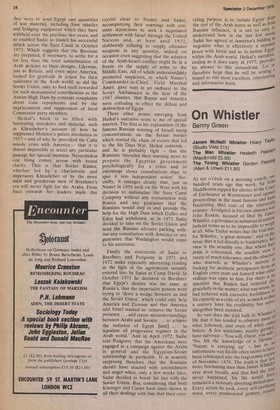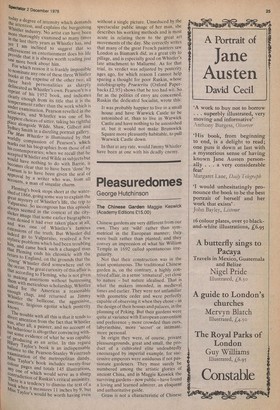On Whistler
Benny Green
James McNeill Whistler Hilary Tao' (Studio Vista £15) The Man Whistler Hesketh Pears° (Macdonald £5.95) The . Young Whistler Gordon Fleming (Allen & Unwin £11.95) At ten o'clock on a morning exactly one hundred years ago this week, Sir MI Huddleston rapped for silence in the Courd of Exchequer at Westminster and oPerleg proceedings in the most famous and WI fascinating libel case of the nineteent" century. Arraigned in his own absence was John Ruskin, accused of libel by Jame,: Whistler, a grievance so nebulous in narrflii judicial terms as to be impossible to weig at all. Miss Taylor writes that the trial was' for Whistler, 'a great mistake', and in Iller sense that it led directly to bankruptcy, net view is the sensible one. But where MI% pride is concerned, the sensible view 1, rarely of much relevance, and the observe' who marvels at Whistler's naivete looking for aesthetic percipience front r English court must ask himself what ntheo redress was open to him. For there is question that Ruskin had behaved chs: gracefully in the matter; what was sv0r had behaved with excessive foolishness I r his capacity as a critic of art, so much so thar inn a century later his credibility hasnsee'vbe.ri altogether been restored. So vast does the trial bulk in WhistIef5t life that it has tended to obscure most o, what followed, and even of what cant; before. A few witticisms, mostly garbl,e,i, have survived — 'You will, Oscar, you w" 'No, for the knowledge of a lifetilueai; 'Nature is creeping up' — but in e unfortunate way his life often seems to havrs been telescoped into the tragi-cornie eyetilyv of November 1878. The truth is that ie r more fascinating men than James Whistle' ever drew breath, and that had the never happened, his life would hay" remained a riotously diverting melodrartia Every action he took, every self-justifYii114 word, every professional gesture, retal' more thoroughly examined so many times yet I am inclined to suggest that so effervescent an entertainment does his life today a degree of intensity which demands the attention, and explains the burgeoning Whistler industry. No artist can have been in the last thirty years as Whistler has, and Provide that it is always worth reading just one more book about him.
to Clearly enough from its title that it is the under examination. Pearson revelled in the ,artist-wits, and Whistler was one of his p ace alongside Wilde, Shaw, Gilbert and books at the expense of the other two; all three have personalities as sharply flaPpiest choices of sitter, taking his rightful Sydney Smith in a dazzling portrait gallery. delineated as Whistler's own. Pearson 's is a rePrint of his 1952 book, and indicates temperament rather than the work which is The Man Whistler is illuminated by that Worldly compassion of Pearson's which 'narks out his biographies from those of all his contemporaries; when we recall that he accepted Whistler and Wilde as subjects but ‘yould have nothing to do with Barrie, it Pearson is to have been given the seal of approval by a writer who was, from all accounts, a man of singular charm. shed of 1866, going some way to explain the Reat mystery of Whistler's life the trip to slicker image that some earlier biographers always seemed in the context of the cityeven denied it had ever taken' place at all, extensions of the truth: But Whistler did and was one of Whistler's famous shtylistic problems which had been troubling Indeed go to Valparaiso, resolved a few 1 For which reason it is frankly alParaiso. So incongrous has ;his episode nominate any one of these three Whistler comes clear that to have been 'done' by Flemings book stopSshort at the water impossible that Fleming came back such a changed man nat Fleming ends his chronicle with the return to England, on the grounds that the :rung' Whistler died somewhere out on e ocean. The great curiosity of this affair is that according to Fleming, who is not given t.? making assertions without buttressing mena with meticulous scholarship. Whistler sailed for the Americas a reasonable enough chap, and returned as Jimmy Whistler the bellicose, the a ggressive, assertive , know litigious egotist which posterity S.
The trouble with all this is that it tends to UlVert attention from the fact that Whistler Was, after all, a painter, and no account. of _ behaviour is altogether convincing ootfit with some evidence of what he was capable 4, Producing as an artist. In this regard llarY Taylor's book is an indispensable u_alance to the Pearson-Stanley Weintraub eilcamination of the metropolitan dandy. icyllss Taylor's book includes twenty-four ;31eur pages and totals 145 illustrations, "ay one of which would serve as a sharp 2iitradiction of Ruskin's critical assimnity. itr,l!te is a tendency to dismiss the text of a When it measures 11 inches by 9, but Taylor's would be worth having even without a single picture. Unseduced by the spectacular public image of her man, she describes his working methods and is most acute in relating them to the great art movements of the day. She correctly writes that many of the great French painters saw London as Bismarck did, as a great city to pillage, and is especially good on Whistler's late attachment to Mallarme. As for that trial, its verdict was adjusted by posterity ages ago, for which reason I cannot help sparing a thought for poor Ruskin, whose autobiography Praeterita (Oxford Paperbacks £2.95) shows that he too had wit. So far as the politics of envy are concerned, Ruskin the dedicated Socialist, wrote this: It was probably happier to live in a small house and have Warwick Castle to be astonished at, than to live in Warwick Castle and have nothing to be astonished at, but it would not make Brunswick Square more pleasantly habitable, to pull Warwick Castle down.
In that at any rate, would Jimmy Whistler have been at one with his deadly enemy.







































 Previous page
Previous page